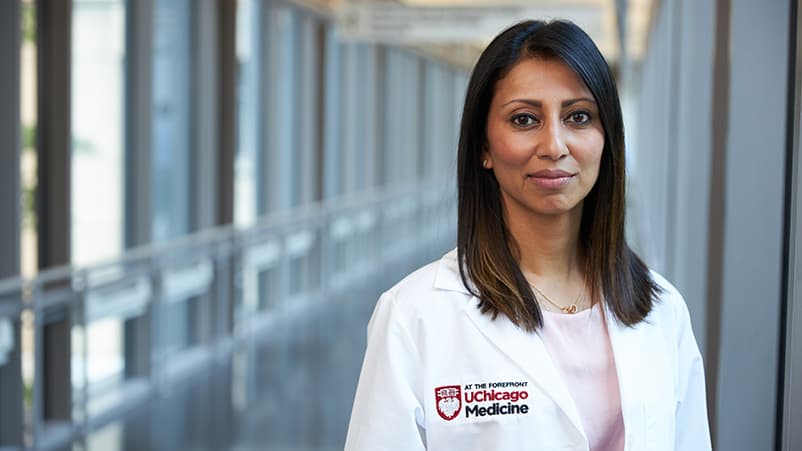Anjana Pillai, MD: On a relentless quest to find answers to liver cancer

Anjana Pillai, MD is the medical director of the multidisciplinary liver tumor program at UChicago Medicine
When Anjana Pillai, MD, was a young girl, people of various religions and backgrounds filed into her family’s house on weekends in a small village in Kerala, India. They came to see her father, Aravind, a primary care physician, who on his days off provided free medical care to those who couldn’t afford it.
Oftentimes, Pillai would sit on her father’s lap, listening and watching as he talked with his patients.
The family moved to California when Pillai was 8 years old to pursue her father’s dream of becoming a physician in the United States. They lived with extended family at first, and then moved cross-country. The family relocated multiple times while her father, who was in his late 30s, working low-paying jobs as he studied for his American medical boards.
As he completed a grueling residency program in inner New York City, her mother was often the sole parent looking after Pillai and her younger sister.
While these were not the easiest years for her family, seeing her father’s work ethic and commitment to helping the disadvantaged ultimately shaped Pillai's career.
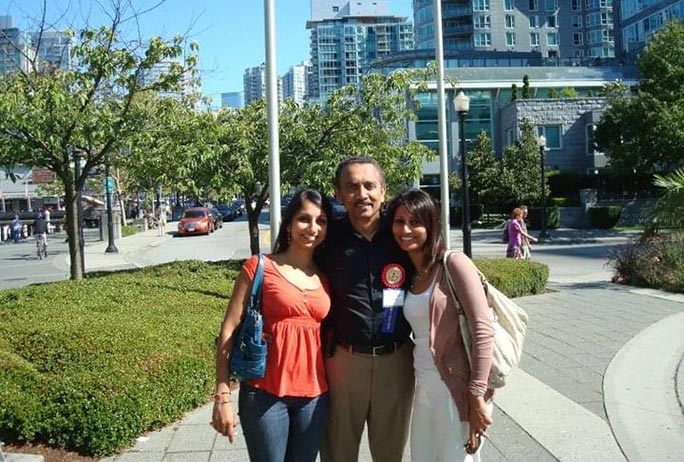
“Growing up the way I did made me so comfortable with different people, different environments and, especially, with change itself. I would meet people from diverse backgrounds and think to myself, 'Cool, this is your story,'” she said. “Also, having to take care of extremely sick people who needed care was never alarming for me. I embraced it, actually, and I knew I would eventually have something to offer.”
Today, Pillai is a transplant hepatologist at the University of Chicago Medicine, specializing in liver disease, liver cancer and liver transplantation. In addition, Pillai is medical director of the multidisciplinary Liver Tumor Program and collaborates with colleagues at UChicago Medicine's Comprehensive Cancer Center to provide individualized treatment options to her patients.
While her youth in India has shaped her medical practice, Pillai's social justice compass is influenced by her family's life in America.
When I hear stories about brutality, racism and discrimination, they touch my soul. It’s personal to me, because we experienced racism, lived on minimal means, and came out of it relatively unscathed.
“I feel very strongly that we need to be advocates, and we need to speak up,” she said. “When I hear stories about brutality, racism and discrimination, they touch my soul. It’s personal to me, because we experienced racism, lived on minimal means, and came out of it relatively unscathed."
She recognizes her family's fortune: "It could have been my parents. It could have been my sister and me. But what allowed us to always feel that we were protected and had a good life, even in trying times, was the closeness of our family. It was also our education, which was a guiding force.”
Moving from Miami to Chicago
Pillai began her medical education at age 20, enrolling in a competitive program for high-achieving students at the University of Miami that combined undergraduate and medical school studies, allowing for completion of both degrees in a shorter time frame.
She became interested in gastroenterology and liver disease during medical school, where Eugene Schiff, MD, a prominent hepatologist who wrote one of the seminal textbooks in hepatology, was a faculty member.
After earning her medical degree at Miami, Pillai, like her father, moved around the country to complete her education. She did her residency in Chicago, followed by a fellowship in Cleveland and then another fellowship that brought her back to Chicago.
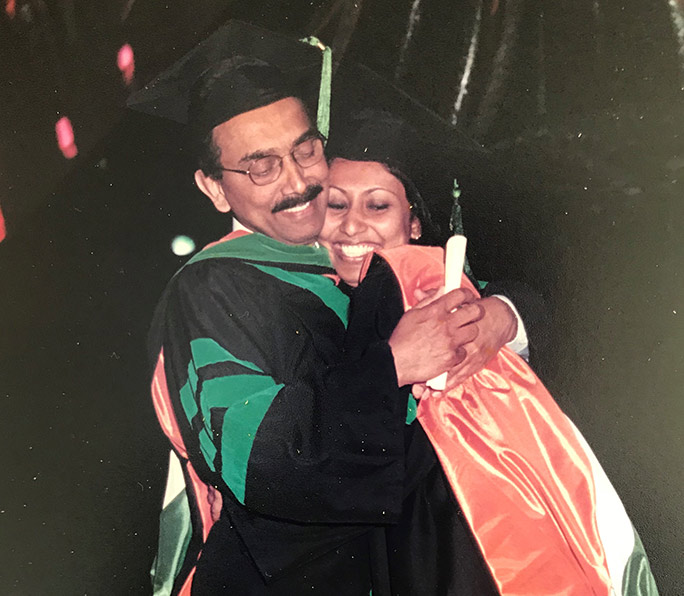
During the two fellowships, Pillai met people who would be influential to her career.
At the Cleveland Clinic, as a gastroenterology fellow, Pillai met pioneering transplant surgeon John Fung, MD (they would reunite years later at UChicago Medicine) as well as other prominent leaders in the field who helped solidify her passion for hepatology and liver transplantation.
During her second fellowship, she learned the value of a multidisciplinary approach to taking care of patients with liver cancer, which would later become a focal point of her career.
All this time, Pillai found herself increasingly drawn to the most complex cancer cases, as she grew and learned in a constantly changing, transformative field.
“Many people do not realize this, but you need your liver to survive. It’s an underappreciated but essential organ,” she said. “The physiology of it is so fascinating to me. It’s almost like plumbing in many ways. Ultimately, if your liver fails, you cannot survive without a life-saving liver transplant.”
Taking on the Toughest Cases
Primary liver cancer is the second leading cause of cancer deaths worldwide, according to the medical and surgical liver specialists and other physicians who have expertise in cancer treatment and intervention.
Liver cancer often occurs in people who already have advanced liver disease or cirrhosis. Common causes include hepatitis B and C, alcoholic liver disease, and fatty liver disease. Optimal treatment for liver cancer involves input from many different specialists, including transplant hepatologists, transplant and hepatobiliary surgeons, oncologists, interventional radiologists and palliative medicine services.
There’s nothing more transformative than to see someone so sick, literally on their death bed, get a new liver and come back to life.
When Pillai was practicing at Emory University Hospital in Atlanta, she started a liver tumor program that brought together specialists from different areas to help provide the best outcomes for patients with liver and bile duct cancer. She started a similar multidisciplinary Liver Tumor Program after she joined UChicago Medicine in 2016, partnering with different sub-specialists who are experts in liver tumors to develop a comprehensive program that offers unique and individualized care.
Among the UChicago Medicine team’s many success stories is a 32-year-old woman who had hepatocellular cancer from an adenoma and was given six months to live. She consulted several specialists, none of whom was willing to try the risky surgery to remove the football-sized tumor on her liver. But then she found UChicago Medicine’s Liver Tumor Program, whose team offered to do the complex surgery. She’s now healthy, married and has a beautiful baby boy.
There was also a young liver transplant patient who had a rare form of bile duct cancer called intrahepatic cholangiocarcinoma. Considered risky and "untransplantable" by other hospitals, the patient, who was near death, received a liver transplant during a 17-hour surgery. Three years after her transplant, she’s alive and well, and has resumed her marketing job and is enjoying life with her family and friends.
“There’s nothing more transformative than to see someone so sick, literally on their death bed, get a new liver and come back to life,” Pillai said. “With a functioning liver, they can restart their life as a healthy person. There’s nothing more gratifying to witness.”
Research, Education, Awareness
Pillai is also on a quest to find answers to the greatest challenges in the field. She has been conducting important research on hepatocellular carcinoma (HCC) and cholangiocarcinoma, often collaborating with experts at other nationally recognized liver cancer programs to conduct outcomes research in HCC. She also is involved in multiple phase 2 and 3 trials for treatment of both HCC and cholangiocarcinoma, and recently participated in a study, funded by the National Institutes of Health, evaluating novel biomarkers in HCC.
Her passion for promoting liver cancer awareness and education prompted her to become a co-founder and a leader of a new national conference, HCC-TAG, which took place in February 2020 in Park City, Utah. This single-topic, two-day conference, which will occur annually, brought together clinicians and researchers for a focused, interactive update of HCC’s rapidly changing treatment landscape and the importance of a multidisciplinary team that provides patients with optimal care.
Having seen firsthand how liver donation can change the course of a gravely ill person’s life, Pillai is an organ donor advocate. She also supports many social justice causes, including Black Lives Matter and Big Brothers Big Sisters of Chicago, recognizing how years of systemic inequality have adversely affected the health and well-being of many.
She and her husband, who have two children, have contributed to various charities over the years, focusing on causes such as education and access for children and young adults, cancer research and groups that deliver equitable access to housing and healthcare for underserved populations.
Looking ahead, Pillai and her UChicago Medicine team remain focused on expanding care and treatment options for patients with liver and bile duct cancer. Advocating for her patients, and treating them with respect and honesty, is an integral part of that.
“I feel very fortunate and grateful to be where I am in life," Pillai said. "I've also been lucky to have leaders and colleagues at UChicago Medicine who support me and the team."
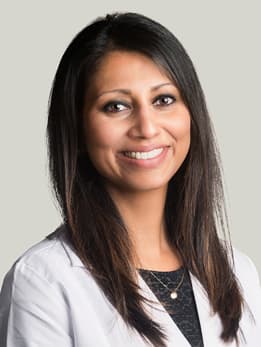
Anjana Pillai, MD
Anjana Pillai, MD, is a board-certified gastroenterologist and transplant hepatologist who specializes in the management of chronic liver diseases. Dr. Pillai is the medical director of the multidisciplinary liver tumor program, which encompasses multiple specialists with expertise in benign and malignant tumors of the liver.
See Dr. Pillai's profile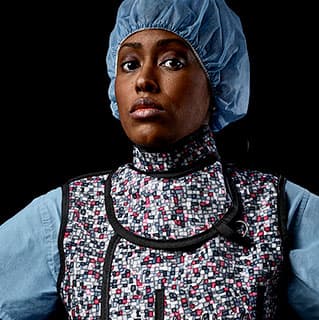
Sickness is relentless. So are we.
We are a leading community of physicians, researchers and game changers. We embrace challenges and turn them into opportunities to make a difference in your life.
Learn more about UChicago Medicine's undaunted approach to care.
